希特勒介绍【英文精品】
- 格式:ppt
- 大小:533.00 KB
- 文档页数:15
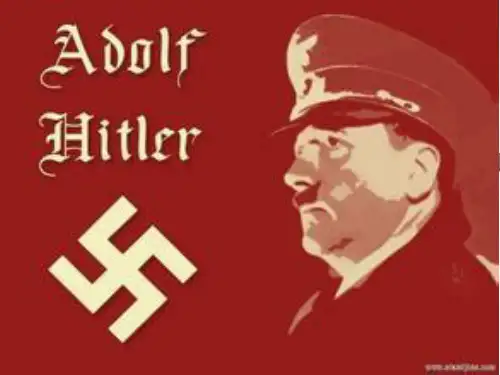
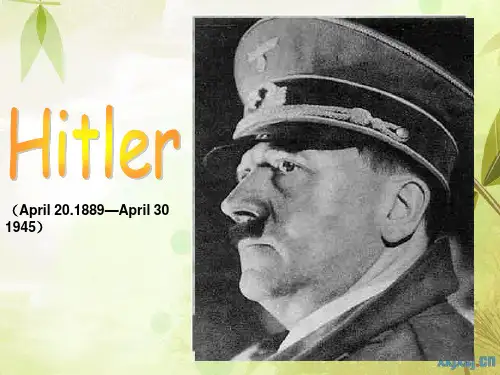

希特勒英文演讲稿第一篇:希特勒英文演讲稿篇一:希特勒演讲稿中英对照英文中文对照格式then someone has said: since the revolution the people has gained rights.the people govern!strange!the people has now been ruling three years and no one has in practice once asked its opinion.treaties were signed which will hold us down for centuries: and who has signed the treaties? the people? no!governments which one fine day presented themselves as governments.and at their election the people had nothing to do save to consider the question: there they are already, whether i elect them or not.if we elect them, then they are there through our election.but since we are a self-governing people, we must elect the folk in order that they may be elected to govern us.然后人们又说:“通过革命我们获得了自由。
”显而易见,这也是不可能的!没错,我们的确可以上街,进出我们的工场,我们还可以四处参加会议。
简而言之,个人确实是获得了自由。
但是大体上来说,如果一个人足够聪明,他最好不要随便开口说话。
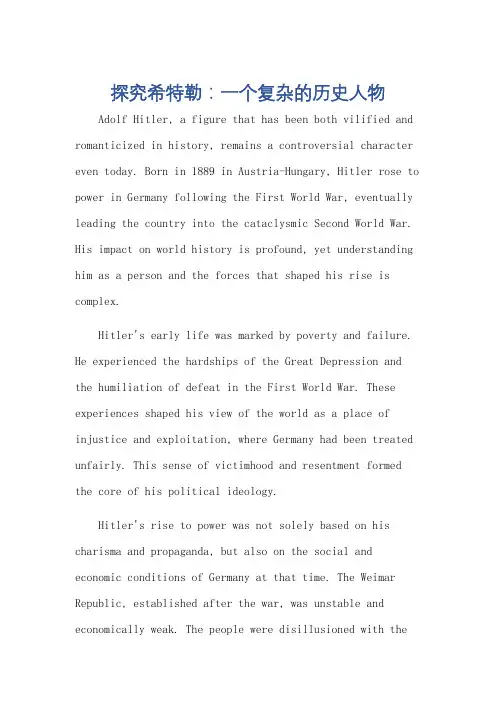
探究希特勒:一个复杂的历史人物Adolf Hitler, a figure that has been both vilified and romanticized in history, remains a controversial character even today. Born in 1889 in Austria-Hungary, Hitler rose to power in Germany following the First World War, eventually leading the country into the cataclysmic Second World War. His impact on world history is profound, yet understanding him as a person and the forces that shaped his rise is complex.Hitler's early life was marked by poverty and failure. He experienced the hardships of the Great Depression and the humiliation of defeat in the First World War. These experiences shaped his view of the world as a place of injustice and exploitation, where Germany had been treated unfairly. This sense of victimhood and resentment formed the core of his political ideology.Hitler's rise to power was not solely based on his charisma and propaganda, but also on the social and economic conditions of Germany at that time. The Weimar Republic, established after the war, was unstable and economically weak. The people were disillusioned with thepolitical class and yearned for strong leadership. Hitler's promise of national rejuvenation and revenge against Germany's enemies resonated with many.His Nazi Party, with its antisemitic and racist rhetoric, capitalized on the fears and anxieties of the German people. Hitler's propaganda machine, led by Joseph Goebbels, used every means possible to spread the Nazi message and create a cult of personality around Hitler himself. The result was a powerful movement that swept Hitler into power in 1933.Once in power, Hitler embarked on a campaign ofnational rejuvenation and expansion. He rebuilt the German economy, rearmed the country, and established atotalitarian state that controlled all aspects of life. His foreign policy was aggressive, seeking to restore Germany's lost territorial gains and influence. This led to the annexation of Austria, the Sudetenland, and ultimately the invasion of Poland that triggered the Second World War.Hitler's leadership style was autocratic and dictatorial. He surrounded himself with loyal followers and purged anyone who challenged his authority. His paranoiaand obsession with power led him to commit atrocities such as the Night of the Long Knives, where he eliminated potential rivals within the Nazi Party, and the systematic murder of millions of Jews, Poles, and other perceived enemies of the Reich.Hitler's impact on world history was profound. His aggressive foreign policy led to the deaths of millions and the destruction of entire nations. His legacy of hate and division has had lasting effects on global politics and society. However, it is important to remember that Hitler was not solely responsible for the horrors of the Second World War. The actions of other leaders, such as Joseph Stalin and Winston Churchill, also played a role.In conclusion, Hitler was a complex figure whose rise to power was influenced by both personal and historical factors. Understanding him requires a nuanced understanding of the social and political context of his time. While his actions and ideologies are deeply immoral and abhorrent, it is important to remember that he was not an isolated figure acting alone. The lessons of history must be learned, andHitler's rise and fall serve as a powerful reminder of the consequences of ignoring the warnings of the past.**探究希特勒:一个复杂的历史人物**阿道夫·希特勒,这位历史人物在世人眼中既被妖魔化又被理想化,即使在今天仍然是一个备受争议的人物。
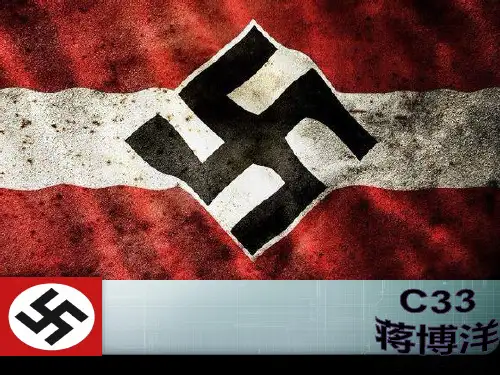
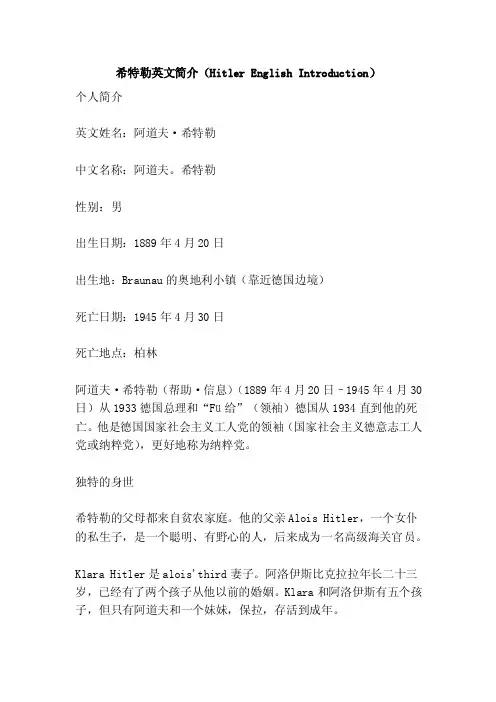
希特勒英文简介(Hitler English Introduction)个人简介英文姓名:阿道夫·希特勒中文名称:阿道夫。
希特勒性别:男出生日期:1889年4月20日出生地:Braunau的奥地利小镇(靠近德国边境)死亡日期:1945年4月30日死亡地点:柏林阿道夫·希特勒(帮助·信息)(1889年4月20日–1945年4月30日)从1933德国总理和“Fü给”(领袖)德国从1934直到他的死亡。
他是德国国家社会主义工人党的领袖(国家社会主义德意志工人党或纳粹党),更好地称为纳粹党。
独特的身世希特勒的父母都来自贫农家庭。
他的父亲Alois Hitler,一个女仆的私生子,是一个聪明、有野心的人,后来成为一名高级海关官员。
Klara Hitler是alois'third妻子。
阿洛伊斯比克拉拉年长二十三岁,已经有了两个孩子从他以前的婚姻。
Klara和阿洛伊斯有五个孩子,但只有阿道夫和一个妹妹,保拉,存活到成年。
发展过程1.student2.soldier3.do在小学4.stop试图成为第一研究最喜欢的游戏艺术5.move维也纳6.receive父亲的公务员养老7.volunteer FR德国军队在慕尼黑9.rebuild8.be纳粹aarty其他士兵逮捕10.establish第三帝国11.base专制mand他的军队去打仗13.die希特勒与中日关系的两面性希特勒关于中国和日本1的想法。
鄙视日本看好中国他看着日本。
但是,他看好中国。
2。
喜欢中国茶叶希特勒喜欢喝中国茶。
3。
希特勒不准报道南京大屠杀希特勒不允许人们报告南京大屠杀。
阿道夫。
希特勒已经不再是之一个人,他泛指了一个时代的血型与残暴,扭曲与狭隘。
他是法西斯的象征,而他背后,是第二次世界大战的开始与终结。
阿道夫·希特勒不再是一个人,他是指血液和残酷的时代,失真和狭窄。
他是法西斯的象征,在他身后,是第二次世界大战和结束的开始。
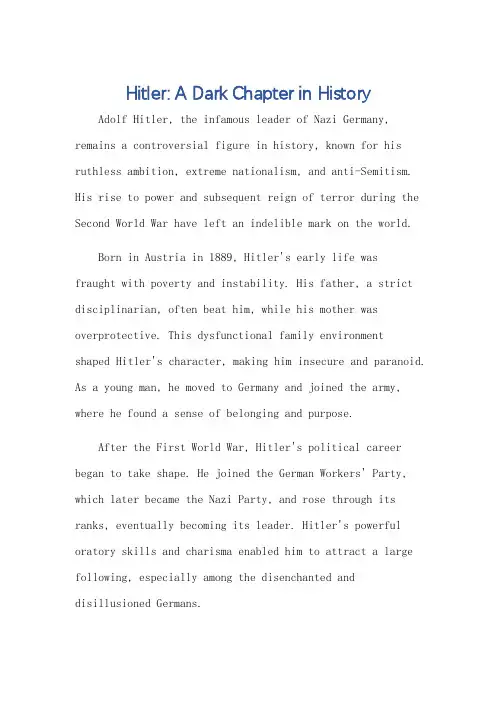
Hitler: A Dark Chapter in HistoryAdolf Hitler, the infamous leader of Nazi Germany, remains a controversial figure in history, known for his ruthless ambition, extreme nationalism, and anti-Semitism. His rise to power and subsequent reign of terror during the Second World War have left an indelible mark on the world.Born in Austria in 1889, Hitler's early life wasfraught with poverty and instability. His father, a strict disciplinarian, often beat him, while his mother was overprotective. This dysfunctional family environment shaped Hitler's character, making him insecure and paranoid. As a young man, he moved to Germany and joined the army, where he found a sense of belonging and purpose.After the First World War, Hitler's political career began to take shape. He joined the German Workers' Party, which later became the Nazi Party, and rose through its ranks, eventually becoming its leader. Hitler's powerful oratory skills and charisma enabled him to attract a large following, especially among the disenchanted anddisillusioned Germans.Hitler's political philosophy was based on extreme nationalism, anti-Semitism, and social Darwinism. He believed that the German race was superior to all others and that the Jews were a threat to German society. He advocated for the expansion of German territory and the elimination of all perceived threats to the Reich.Under Hitler's leadership, the Nazi Party gained significant political power in Germany. In 1933, Hitler became the Chancellor of Germany and quickly consolidated his grip on power. He abolished democratic institutions, established a totalitarian state, and began to implement his radical agenda.Hitler's reign of terror was marked by widespread discrimination, persecution, and violence. Jews, homosexuals, political opponents, and others were targeted for elimination. Concentration camps were established, and millions of people were killed or enslaved. Hitler's ambitions led him to invade numerous countries, including France, Belgium, the Netherlands, and Russia, in a bid for world domination.The Allied Powers, led by the United States, Great Britain, and Russia, eventually defeated Germany in the Second World War. Hitler's reign came to an end in April 1945, when he committed suicide in his bunker in Berlin, rather than face capture and trial.The legacy of Hitler and the Nazi era is complex and multifaceted. While Hitler's actions and ideologies were barbaric and reprehensible, they also serve as a stark reminder of the dangers of unchecked ambition, intolerance, and hatred. Hitler's rise to power and the atrocities committed under his leadership are a cautionary tale forall nations and generations.**希特勒:历史中的黑暗篇章**阿道夫·希特勒,纳粹德国的臭名昭著的领导人,以他冷酷无情的野心、极端民族主义和反犹太主义而臭名昭著,在历史中是一个充满争议的人物。
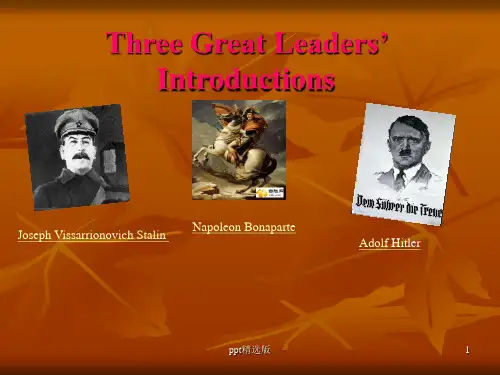
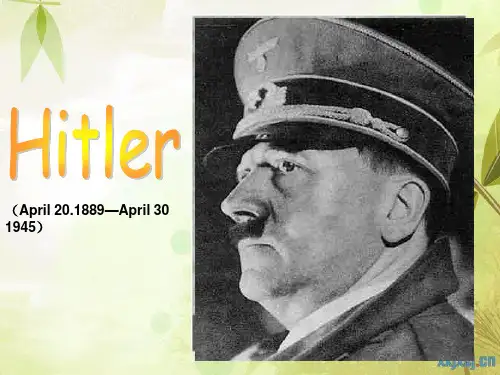
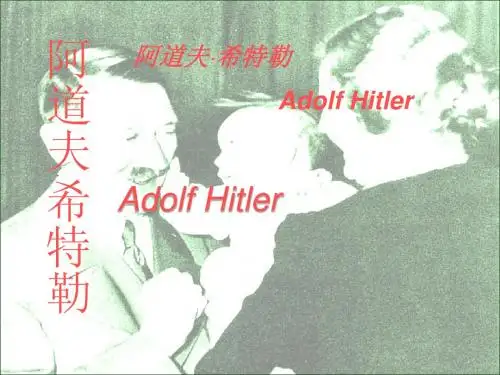
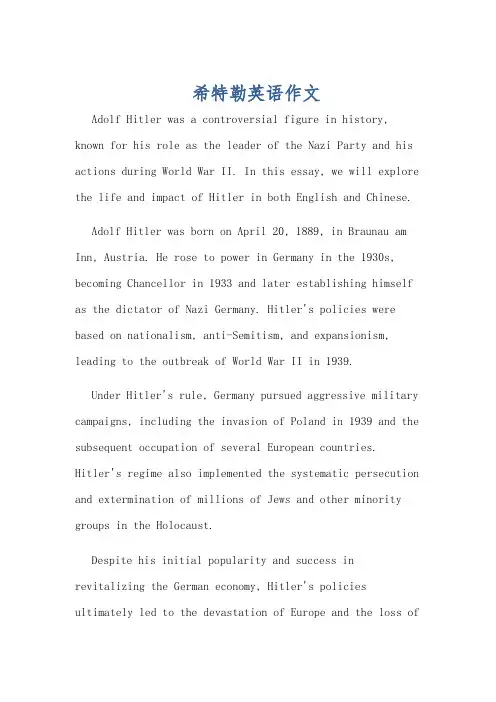
希特勒英语作文Adolf Hitler was a controversial figure in history, known for his role as the leader of the Nazi Party and his actions during World War II. In this essay, we will explore the life and impact of Hitler in both English and Chinese.Adolf Hitler was born on April 20, 1889, in Braunau am Inn, Austria. He rose to power in Germany in the 1930s, becoming Chancellor in 1933 and later establishing himself as the dictator of Nazi Germany. Hitler's policies were based on nationalism, anti-Semitism, and expansionism, leading to the outbreak of World War II in 1939.Under Hitler's rule, Germany pursued aggressive military campaigns, including the invasion of Poland in 1939 and the subsequent occupation of several European countries.Hitler's regime also implemented the systematic persecution and extermination of millions of Jews and other minority groups in the Holocaust.Despite his initial popularity and success inrevitalizing the German economy, Hitler's policies ultimately led to the devastation of Europe and the loss ofmillions of lives during World War II. His defeat in 1945 marked the end of the Nazi regime and the beginning of a new era of international cooperation and peace.希特勒是历史上一个备受争议的人物,以其作为纳粹党领袖和在二战期间的行动而闻名。
一篇关于希特勒的背景和影响英语作文Who Was Adolf Hitler?Adolf Hitler was a very bad man who lived in Germany a long time ago. He was the leader of the Nazi Party and became the ruler of Germany from 1933 until 1945 during World War II. Hitler had a huge impact on history because of the terrible things he did and the millions of people he hurt.Hitler's Early LifeHitler was born in 1889 in Austria. As a young man, he struggled to make friends and do well in school. He failed to get into art school and drifted around doing odd jobs. When World War I started in 1914, Hitler joined the German army and served as a messenger on the front lines. He was awarded some medals for bravery.After the war ended in 1918, Hitler was very upset that Germany had lost. He blamed Jewish people and communists for Germany's defeat. In 1919, he joined a small far-right political party called the German Workers' Party which later became the Nazi Party.Hitler and the Nazi PartyThe Nazi Party believed that the "Aryan" German people were a superior master race. They discriminated against Jewish people, criticized democracy, and wanted to unite allGerman-speaking areas into one great German empire.Hitler was a powerful public speaker who could stir up a lot of anger and hatred. As the Nazi Party grew stronger in the 1920s, its members used violence against opponents and Jewish people. In 1923, Hitler tried to take over the government in Munich but his attempt failed and he went to jail.After getting out of jail, Hitler decided to try building his Nazi movement peacefully and through democratic means at first. The Nazi Party gained more support from Germans who were very unhappy about economic problems like high unemployment after the Great Depression started in 1929.Hitler Becomes Dictator of GermanyIn 1933, Hitler was appointed Chancellor of Germany after the Nazi Party won the largest share of seats in parliamentary elections. Once in power, Hitler quickly made himself an absolute dictator, outlawed all other political parties, and had his opponents arrested or killed. Through fear and propaganda, he enforced the Nazi racist beliefs across German society.World War II and the HolocaustAfter becoming dictator, Hitler openly defied the Treaty of Versailles that had been imposed on Germany after World War I. He rapidly re-armed the German military and started making territorial demands to unite ethnic Germans outside Germany's borders. This aggression led Britain and France to declare war on Germany in 1939, starting World War II in Europe.As part of Hitler's deranged racist beliefs, he wanted to create a "master race" based on people with blonde hair and blue eyes. He viewed Jews, Slavs, Roma people, disabled people, and others as racially inferior. The Nazis brutally persecuted these "undesirables", killing as many as they could in what is known as the Holocaust.Millions of Jews were rounded up into overcrowded ghettos and Nazi death camps like Auschwitz. There, they were starved, forced into harsh labor, experimented on in cruel ways, or systematically killed in gas chambers. By the end of the war in 1945, the Nazis had slaughtered around 6 million Jewish people along with millions of others in the Holocaust - one of humanity's most evil genocides.The End of Hitler's ReignEven though the Nazis controlled most of Europe at one point, the Allies (Britain, the U.S., Soviet Union, and others) fought back fiercely and liberated territory from Hitler's forces. After the Soviets captured Berlin in 1945, Hitler committed suicide rather than surrendering. World War II finally ended a few months later when Germany and Japan surrendered.Hitler's racist ideas and horrific genocide made him one of the most hated men in all of history. Thanks to defeating the Nazis, the world made progress in protecting human rights and ethnic minorities. The Holocaust Museum in Washington D.C. commemorates the victims and educates people about standing up against hatred and discrimination.Hitler's Nazi regime shows how dangerous racism and extreme nationalism can become when intolerant leaders rise to absolute power. The Holocaust is a constant reminder that we must be accepting of all people and never allow such a tragedy to happen again.。
希特勒演讲稿英文版导语:信仰比知识更难动摇;热爱比尊重更难变易;仇恨比厌恶更加持久以下是小编为大家搜索整理的,欢迎阅读。
希特勒演讲稿英文版Today,westandhere!StandingintheChineseland!Thea ncestorswithbloodanddignitytoirrigateland!Infrontof me,standingisanation,anationinthehumiliationofmoan! TheOpiumWarandthewarofresistanceagainstJapansince,o urnationalprideisnot!Thewinnersareonourneckstyranni callyabuseonespower,theywilltreaddownourdignity,anA siancontinentsmostnoblenationaldignity!Youtellme,yo uchoosetobeafreedomfighterlikeBenjamin.Martin,orasl ave!Youmaywanttosay:Sir,Ineededajob,apieceofbread.Y es.Youareright,lifeistooimportant.ButIwanttotellyou .Inthisworldthereisathingmoreimportantthanlife,they arefree!Thatisadignity!AslongastheSouthChinaSeaandthenorthwestregionov eradaystillfliesinferiorflag,ourdignitydoesnotexist !Aslongastheinferiorinourlandrunamuck,ourdignitydoesnotexist!AslongastheAsiandomain,thecountrycalledCh inaisweakstate.Ourdignityisnotexist!Aslongasthepeop leofothercountrieswilllaughinthecontextoftheChinese wordbeingissued,ourdignitydoesnotexist!Whatweneed,notapieceofbread!Butalivingspace!Ana tionallivingspace!Thelivingspace,isnotachievedbybeg gingandprotest,butbybloodandirontoachieve!Othersbullyus,eventheweakestpeopletotrampleonus ,wewillonlyshoutandprotest,suchaperson.Thereisnobon es!Suchaperson,ishumble!Weshoulduseacannontodeafear soundearthquakelettheenemytremble!Weshouldcrushthei rdignity,life,letthemknowwearenotonlyknowofprotest!Youhavetoremember,aknowonlyinprotestofthestate, isnotaheadofstate!Oneonlyunderstandstheprotestsagai nstthegovernment,isanobones,officepolitics!Whenourd ignity,territory,livingspacearetrampleduponit,alsos hamelesslyprotestedthegovernment,wedontneed!Youfina llywillabandontheir!Improudofyou,inthesepeople.Soth emanwithoutbones,lessandless!Infrontofme,isakeepMil lenniumunyieldingbloodlegion!Thisblood,onceinouranc estralvascularwhichflowsthrough,theydidnotyield!Now,theyareinourbodyinsideaflush,youtellme.Wouldyoulik etocoolit!?Abletounitethepeople.Therearetwothings:thecommo nidealandthecommoncrime.WearecarvingintheChinesenat ionalflagabovethegreatideal,wewillforthisidealoutou rlastdropofblood!IntodaysBerlin.Nothingcansaveourmo therland,onlytheideal!Negotiation?Thisisagreatshame !Wehaverefusedtoperformitisdeterminedandthereason!D oyouwanttodo!JustlikeBenjamin.Martinpicksupthegun,a sheledhiscountrymenholdingaloftthebannerasfreedomfi ghting!Ifyouwishtofight,thefight!ThenIcanseeyouareo nebillionthreehundredmillionoronebillionthreehundre dmillionoftheslavesbeandunyieldingchinese!Ifoneday,Iwouldwant,Benjamin.Martin,holdingbelo ngstoourChinesenationbannerrushestothefront!Eventhe dead,Iwillsmileinheaven!IwillseethegloryofChinesean cestors,IcanholdingaheadhightogotoQinShihuangthegre at,TangTaizong,Kublai,and,Icanproudlysaidtohim:I,yo urchildren,notgiveyouloseyouface,IasthegreatChinsen ationshedthelastdropofblood!Wedonotfightforslavery!Wefightforfreedom!Wearenotmachines,notcattle,wearethepeople!Neveryieldtothe chinese!Weinthenameoffreedomtounite!Asanew,fairworldwar !Weallhavetowork!ForthosewhoenslaveusoutofChinesela nd!Wedontneedalldayshoutingprotests!Fightforourdign ity!Forourpromisetofight!"Fortheliberationofthecountry!TheChinesepeople,w eprovideourancestorsglory!Forourdescendantscanproud lypropaganda:weneveryieldtothefamily!"Myfellowcitizens,ChinaandtheChinesepeoplelongl ive!Longlivefee译文今天,我们站在这里!站在德国人的土地上!站在柏林,这块我们祖先用鲜血和尊严浇灌的土地上!我的身后,是安德烈.柯里昂的雕像!他是全世界公认的自由斗士!他是全世界的光!”“我的面前,站着的是一个民族,一个在屈辱中呻吟的民族!”“那场战争结束之后,我们这个民族的骄傲就没有了!那些战胜者们骑在我们的脖子上作威作福,他们随意践踏我们的尊严,一个欧洲大陆上最高贵的民族地尊严!你们告诉我,你们是选择像本杰明.马丁一样去做一个自由的斗士,还是一个奴隶?!”“你们或许要说:希特勒先生,我需要一个工作,一块面包。
英文作文:Adolf Hitler: A Brief IntroductionAdolf Hitler, a name that still resonates with controversy and history, was a German politician and the leader of the National Socialist German Workers' Party, commonly known as the Nazi Party. His rise to power and subsequent actions had a profound impact on the 20th century, particularly during the Second World War.Born in 1889 in Braunau am Inn, Austria-Hungary, Hitler developed an early interest in politics and nationalism. After serving in the German army during the First World War, he joined the political scene and soon became the leader of the Nazi Party. His charismatic speeches and propaganda skills helped him gain a significant following among the German population, especially the working class and the middle class.Hitler's ideology was based on extreme nationalism, anti-Semitism, and racism. He believed that the Germans were a superior race and that the Jews and other minorities were inferior and should be eliminated. His policies led to the implementation of the Final Solution, which resulted in the systematic extermination of millions of Jews and other minorities throughout Europe.In 1933, Hitler became the Chancellor of Germany and effectively took control of the country. He established a totalitarian regime that suppressed political opposition, censored the media, and controlled the economy. His policies also led to the rearmament of Germany and the expansion of its territory through military aggression.Hitler's actions during the Second World War further cemented his image as a war criminal. He oversaw the invasion of several European countries, including France, Poland, and the Soviet Union, leading to the death of millions of civilians and soldiers. In the end, Hitler's regime was defeated by the Allied forces, and he committed suicide in his bunker in Berlin in 1945.Despite his role in causing immeasurable suffering and destruction, Hitler remains a controversial figure in history. His rise to power and the events that followed have been extensively studied and analyzed by historians and political scientists.中文翻译:阿道夫·希特勒:简介阿道夫·希特勒,这个名字仍然与争议和历史息息相关,他是一位德国政治家,也是国家社会主义德国工人党(通常被称为纳粹党)的领袖。
希特勒英语作文Adolf Hitler, a name that evokes strong emotions and memories of one of the darkest periods in human history. He was a man of great charisma and oratory skills, able to captivate and sway the masses with his powerful speeches and promises of a better future.His rise to power was marked by a combination of political maneuvering, manipulation, and the exploitation of public discontent. He skillfully used propaganda to spread his ideology of racial superiority and the need for a pure Aryan race, while demonizing and scapegoating minority groups such as Jews, Romani people, and homosexuals.Under his leadership, the Nazi regime implemented policies that led to the systematic persecution, imprisonment, and extermination of millions of innocent people. The Holocaust, a horrific chapter in human history, saw the mass murder of six million Jews, as well ascountless others who did not fit into Hitler's vision of a perfect society.Hitler's ambitions extended beyond the borders of Germany, as he sought to conquer and dominate other nations through military aggression. The outbreak of World War II, sparked by Hitler's invasion of Poland, resulted in widespread destruction and loss of life on a global scale.Despite the eventual defeat of Nazi Germany, the impact of Hitler's actions continues to be felt to this day. The scars of war, the trauma of the Holocaust, and the lessons learned from the atrocities committed under his rule serve as a stark reminder of the dangers of unchecked power and the consequences of hatred and intolerance.In conclusion, Adolf Hitler's legacy is one of infamy and tragedy. His actions and the ideology he espoused have left an indelible mark on the course of human history, serving as a cautionary tale of the destructive potential of unchecked power and the importance of standing up against tyranny and injustice.。